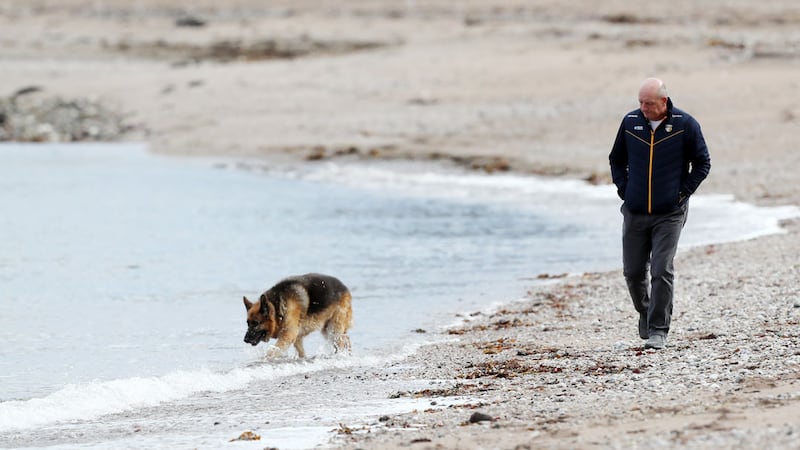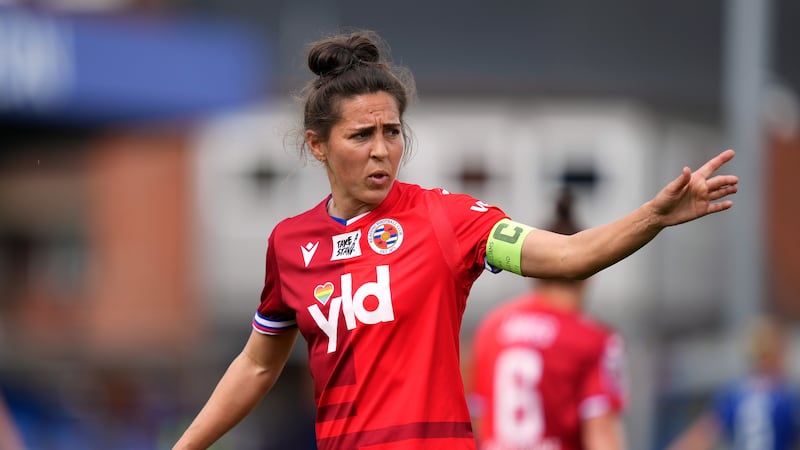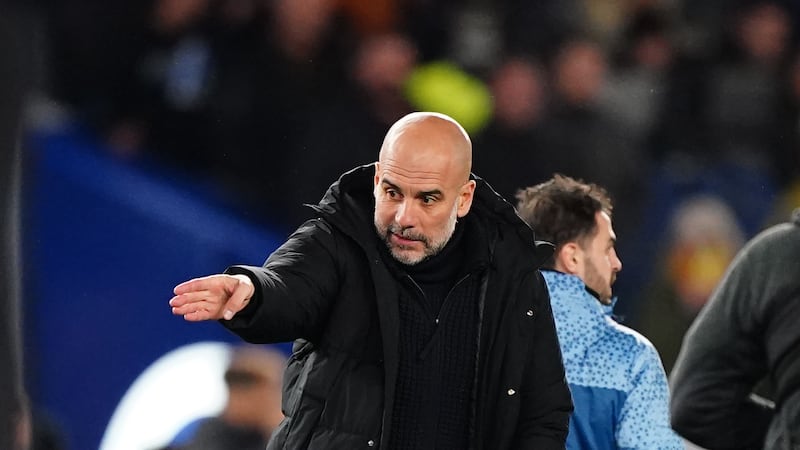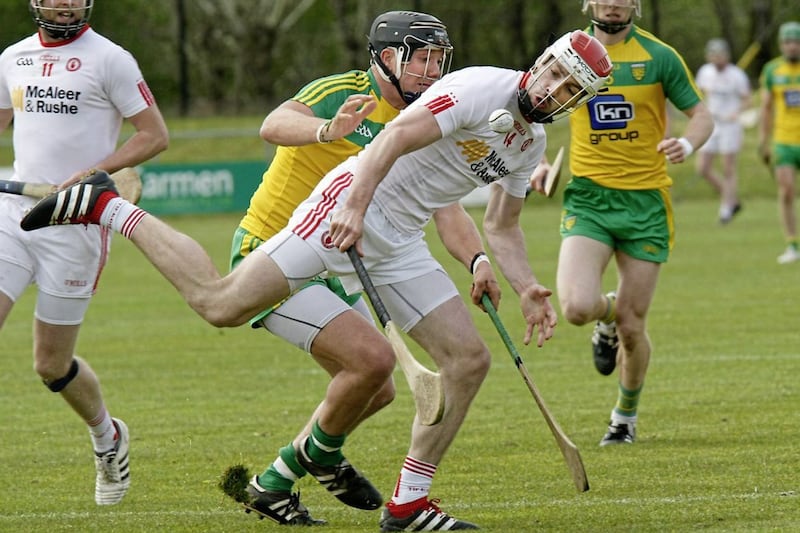In Part Two of Brendan Crossan's in-depth interview with former Antrim hurler Terence McNaughton, he talks about the failures of his native county and when tragedy struck...
TWO moments stand out for Ciaran Barr in the 1989 All-Ireland final against Tipperary.
Antrim’s teak-tough full-forward remembers catching the first ball and shooting wide; the other was breaking Bobby Ryan’s hurl in half.
“I can remember like it was yesterday,” says Barr. “Jim Nelson decided to play me at wing-forward, even though I’d number 14 on my back, because the guy who was wing-back for them – John Kennedy – I’d given him a tough time the year before in the semi-final. So they put me onto him again.
“I caught the first ball, ran through and hit it wide.
“That was one of the first shots of the game. Then I remember the second shot of the game - ‘Clute’ [Oclan McFetridge] had a free towards the Canal End and hit it wide.
“Tipp could almost sense that they were getting off the hook. If we’d put them under pressure early on they would have reacted in some way but we didn’t push them hard enough.”
Barr adds: “I also remember breaking Bobby Ryan’s hurl. He was centre-back and I was moved to centre-forward and I remember in an interview before the game he was talking about his favourite hurley and how he’d it for like three years.
“I thought if I get a chance under a high ball I’m just going to pull as hard as I can and smash his good hurley, which is what I did.
“Why reveal you’ve got a favourite hurl? The things you remember...”
Tipp had lost the ’88 All-Ireland final to Galway and were on a mission to win their first Liam MacCarthy since 1971 against Antrim the following year.
“I was taking the frees that day,” recalls Tipp forward Nicky English, “and I was taking one right under Hill 16 and the crowd that was there from Antrim was absolutely remarkable, the colour.
“They started whistling and it was a very narrow angle. I remember thinking: ‘If I miss this now, I’m going to get some doing from this crowd here.’
“That’s exactly what I thought. Thankfully, I didn’t miss…”
Antrim, the country’s favourite All-Ireland gatecrashers, didn’t stand a chance of beating Tipperary.
“The worst team Antrim could have been playing in the final that year was Tipperary,” English adds.
“We were happy to be in the All-Ireland final in ’88 but we never turned up on the day, myself included. In ’89, we weren’t there to meet the President - we were there to win.
“There was a huge build-up to that game up in Antrim. We had that the previous year and in ’89 we totally shunned the media. I was working in Dublin at the time and I got a double-decker bus to meet the rest of the lads in the Burlington. I couldn’t have cared less about the trappings of the All-Ireland final. We were there to eventually win one.
“Having said that, at the start of that game, Antrim missed a lot of chances.”
English ran riot against hapless Antrim, hitting a remarkable 2-12 tally while Pat Fox and Declan Ryan helped themselves to 1-2 and 1-3, respectively as Tipp cruised to a handsome victory.
Played in front of 65,496 supporters, Antrim’s big day quickly turned into a nightmare. Once Tipp hit the front the 1989 All-Ireland final was over as a contest.
Even though defeat was assured from a distance out, Terence McNaughton was one of the few Antrim players who emerged with credit.
In the face of an avalanche of Tipperary scores, the Cushendall man was a glowing parable for never giving up, hitting three points from play.
“Terence was a really fair player,” English recalls. “He was a great hurler as well, very skilful for a guy of his size. He was a hard player but he was a gentleman. In that All-Ireland final in ’89 he carried the fight to Tipp.”
In 1991, McNaughton’s talent was recognised with a GAA Allstar award.
“’Til this day, I see it as a massive missed opportunity because you don’t get it back again.” – Ciaran Barr reflects on Antrim’s 1989 All-Ireland final loss to Tipperary
SHAFTS of early afternoon sunlight hit the floor of The Lurig Bar in the main street of Cushendall.
McNaughton relaxes with a mug of coffee and a tin of tobacco is nearby.
He doesn’t feel the least bit of nostalgia towards 1989.
“Let’s put ’89 to bed,” he says.
Pointing to the digital recorder on the table beside us, McNaughton adds: “Write that down, would you? We failed. We got f***ing hammered.
“It’s overplayed and it’s over-hyped. Like, we’d better days. Staying in Division One for seven or eight years [was a bigger achievement]…”
Oclan ‘Clute’ McFetridge wrote his name into the history books, pouncing to score two goals that broke Offaly’s resistance in the semi-finals.
“‘Clute’ was our Georgie Best,” says McNaughton.
“He was cocky, he could play soccer, a class act. He was more talented than any of us, way more talented.
“We had a great bunch of players…Niall Patterson was one of life’s gentlemen, We had Brian Donnelly, [Aidan] ‘Beaver’ McCarry, James McNaughton, Gary O’Kane, Leonard McKeegan, the entire team… and all great characters.
“Put Ciaran Barr in front of a crowd in Croke Park, he produced the goods. He was strong. He played water polo for Ireland. He was as good a catcher of a ball as I’ve ever seen.”
Beating Offaly on August 6 turned out to be Antrim’s All-Ireland final.
“Before we left Croke Park after beating Offaly that day we’d lost the All-Ireland final,” McNaughton says without fear of contradiction. “I didn’t hear anybody saying: ‘We’ve got to go on and win this.’”
Between the Offaly and Tipperary games, Antrim went “buck daft”. The Antrim hurlers were treated like rock stars.
The media travelled from all over the country to hear the back stories of McNaughton, Niall Patterson, ‘Woody’ McKinley, ‘Clute’, ‘Beaver’, the Donnellys and the alchemist Jim Nelson.
The guitar-playing Niall Patterson penned an All-Ireland final song for the squad.
“We were carried away with it all,” McNaughton says.
“We loved it. Of course we enjoyed it. We thought we were superstars. Nobody mentioned we’d a hurling match to play at the end of it.”
The Antrim team bus received the customary Gardai escort to Croke Park to face Tipp.
Somebody quipped at the back of the bus: ‘Could you imagine the RUC doing this for us?’
As he stepped off the bus, McNaughton vividly remembers a woman putting rosary beads into his hand. Little did the woman know his mother had sewn St Joseph’s prayers and medals into his shorts.
Barr says: “Until you’re in the final, I don’t think you realise how big a deal it is. It’s a media event; it’s a carnival, a festival. People travel from all over the world to go to the All-Ireland hurling final.
“We got distracted. Our energy was dissipated before we even played the final…
“We had one go at it, one window in time, where we had that group of players together.
“For me, it’s a huge regret. But what can you do? You live your life and you move on.”
“Retiring from hurling was deeply personal. I found it hard. Hurling gave you a purpose. Playing the game I loved, you knew you were alive. I’m not the guy who washes his Volkswagen Golf on a Sunday morning ‘til it’s absolutely spotless. I was never that person. I miss playing hurling. I just miss playing the game I’m passionate about.” – Terence McNaughton
TERENCE McNaughton married Ursula Lemon in Rome on June 1 1987. They have three children – Terri-Marie, Shane and Christy and one grandchild, five-month-old Cara.
The speech impediment that cast a dark cloud over McNaughton’s school days became less of an issue as he grew older. Being good at hurling probably helped on some level.
“You reach the stage where you just say: ‘F*** it’. There was no technique that I had. I went to Scotland for speech therapy; I went to Belfast every Friday morning to get acupuncture. God knows why.”
Barr remembers the night McNaughton was voted Ulster GAA Writers Personality of the Year and upon collecting his award he was asked to make a speech.
“That was the night he felt he faced his demons. He stumbled a little bit through the speech but in no way would you have said: ‘This guy has a stammer.’ I think that was a big stepping stone for him in terms of his confidence.”
Away from the hurling field, McNaughton suffered the tragic loss of his two best friends, killed in separate road accidents – cars, he says, he should have been in.
Philip McCaughey was killed on the M1. The fatal accident caused massive tailbacks on the motorway.
McNaughton was making his way back from Crossmaglen and got stuck in the traffic.
Little did he know that the traffic congestion was caused by Philip’s fatal accident.
“The one thing I always remember about Philip – and this will mean nothing to nobody, only people with speech impediments – he never finished my sentences.”
Maurice O’Neill, another close friend, and his partner were killed in a car accident on the M2 soon after leaving Terence and Ursula.
“I’d a dog at the time - a German Shepherd - and the dog wouldn’t allow Ursula to walk it home. This had never happened before. I’m not saying anything freaky, but the dog definitely behaved awkward that night. I couldn’t get into Maurice’s car because I had to walk the dog home.
“So I walked the dog home and they got killed on the M2. They missed the turn-off for Mallusk, tried to do a u-turn and a car hit them. I felt guilt because I knew the turn-off and if I had been in that car it wouldn’t have happened.
“Philip and Maurice were the two closest friends I had. All those things affect you.”
“I would stand by this in any company: he is the best coach in Ireland. You talk about giving back – he couldn’t give any more back because he is totally and utterly obsessed by the game. He won’t go out of date. He won’t be old school in 10 years. He will evolve as the game evolves.” - Neil McManus
McNAUGHTON raged against the dying light before bidding farewell to the inter-county stage in 1997. He left with a pocketful of Ulster medals but an All-Ireland medal proved elusive.
Ruairi Ogs, his club, squeezed a few more years out of his ageing frame.
“You know you’re finished," he says, "when your brain is telling you: ‘You need to run out to the ’45 and your body’s telling you: ‘I aint f***ing going’.”
When his playing days ended in 1999, management was an obvious path for McNaughton to go down.
He has coached teams in his club at virtually every age group.
“Coaches get carried away. Unless a team is a good team, they don’t want anything to do with them. People in clubs don’t want to look after teams unless they’re successful. You have develop players.
“I managed teams that lost by 60 points but we got as many good hurlers out of bad teams as we did out of good teams. I would gladly go and manage the worst team in my club and enjoy it as much as the good teams I’d managed.”
Alongside ‘Woody’ McKinley, he nurtured one of the best minor teams the county ever produced (2005/06) and is currently joint senior manager with McKinley, Neal Peden and Gary O’Kane.
McNaughton is one of those rare breeds. He has never managed outside of his own club and county. It’s a monogamous relationship.
“I’m passionate but I can only be passionate about one team,” he says.
“Anybody who has met him knows the kind of infectious personality that he has. He is just wall-to-wall passion,” says current county hurler Neil McManus.
“I’m sure he keeps being asked: ‘Why do you keep going back to Antrim and Cushendall to take teams?’ He genuinely can’t help himself.
“He is hurling from morning to night. That’s why he’s had the effect on my generation and probably his own generation.
“He wants everybody to get the very last drop out of themselves - to make themselves as good a player as they can be.
“He’s a very influential character. He’s great with people, socially or in a changing room. He knows how to speak to people and get his message across.
He’s just a very charismatic person.”
“Your club means that you’re playing with guys who are going to carry you to your grave. That’s what a club is.” - Terence McNaughton
TIME moves on at a lightning pace. He doesn’t put a time-frame on how long he’ll be part of the Antrim set-up.
Relegation, you sense, is still fairly raw.
You also get the feeling that the modern player doesn’t always sit easily with him.
He yearns for some old, more durable values that governed his own playing days, when you got the negative “and that’s all you got”.
“The game has evolved and we’ve evolved with it,” McNaughton says. “Coaches have to evolve. It’s the old saying: ‘You cannot progress without change but not all change is progression.’”
The things he’ll never understand are the players who don’t want to test themselves at the highest level and the prevailing tension between club and county.
“Even this year frustrates the life out of me. We could have been in the League play-offs instead of being relegated.
“I’m from Cushendall, I’m a proud Cushendall man but I don’t see where I have to sacrifice my feelings for my club because I’m also a county man.
“I think that’s the big question that needs answered: Why are people not ambitious? We were ambitious. I wanted to hurl in an All-Ireland final. I wanted to go out against the good teams. I wanted to play against the best hurlers in Ireland.
“Surely you should want to go to the next level all the time. I think people are afraid to climb the ladder in case it’s lying against the wrong wall.
“Climb the ladder, be ambitious, go out and if you fail, so what... The worst failure is not to try. Some people are afraid of failure, they’re afraid of being criticised.
“Some people are afraid to have a go at it. To me, they’ve failed. Once you make a decision not to have a go that’s failure.
“I played against DJ Carey, Joe Cooney and guys like that.
“I don’t care how many people queue up to tell me I was over-rated. I have memories that nobody is taking from me.
"I know when I lie in my bed at night or walk along the beach I had some brilliant days, and some of those brilliant days were bad days for Antrim and bad days for me. But it makes you who you are.
“For people to waste talent and not want to play county and not want to play at the highest level, to me, is sinful.”
McNaughton is in full flow when his wife Ursula wheels baby Cara into the room.
He's transported immediately back to the present.
He takes his bright-eyed grand-daughter in his arms and says: “Being a grandfather is fantastic, just like every grandfather would tell you.
"I don’t feel any older. I still feel young-minded. I still get shouted at for playing my music too loud. My mother shouted at me when I was 16 or 17 and my wife shouts at me and I’m 54."
You get the overwhelming sense life is good up in Cushendall - and a feeling that there is still plenty of hurling road in front of Terence McNaughton.








